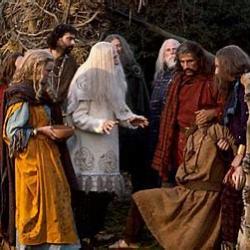 The term general revelation is named so in reference to its general scope. The general revelation reaches all people in all places and times (Matthew 5:45). As such, the Bible is not general revelation, but does speak on the general revelation of God in the world and cosmos around us (Psalm 19:2). General Revelation effects all people no matter where or when they lived. Paths of General Revelation General Revelation reaches humanity by many different avenues. We will attempt to articulate a few of them here:
The term general revelation is named so in reference to its general scope. The general revelation reaches all people in all places and times (Matthew 5:45). As such, the Bible is not general revelation, but does speak on the general revelation of God in the world and cosmos around us (Psalm 19:2). General Revelation effects all people no matter where or when they lived. Paths of General Revelation General Revelation reaches humanity by many different avenues. We will attempt to articulate a few of them here:
Through the created Cosmos
This is typically referred to as the Cosmological Argument for the Existence of God. In its base form it states that the universe is an effect that requires a cause. The line of evidence has three presuppositions that must be true. A.) every effect has a cause, B.) The effect caused depends on the cause for its existence and finally C.) Nature cannot originate itself.
Theoretical Development
If something exists now, then it either came from nothing or it came from something. To say that the universe came into being on its own and was created by nothing that means it is self-created. This is a logical contradiction because it means that before the universe existed, it would have had to create itself, a scientific and philosophical impossibility. Self-creation has never been scientifically proven. Therefore, if the universe did not create itself.
If this is in fact true, something outside of the universe had to cause its creation. For this answer, there are many avenues, the Christian obviously takes the theistic approach that says an eternal God created the universe. Even though the pursuit of this discussion appears scientific, what we find in the both the ancient pre-Christian Celtic mythology and in Celtic spirituality is a close and loving relationship with creation. So, although it appears scientific, it is noticeably clear in Celtic Christianity that this belief is central to theology. God created the universe, and this means the universe is loved by God, its creator. We learn immediately from creation that God is a Living God because dead things do not produce life on their own.
General Revelation is a Biblical Truth
Scripture backs up the reality that God communicates through the general revelation of the created universe. Psalm 19:1-6 describes the continuing revelation through creation. The verbs in the verses describe continuous action in the telling of Gods story and of Gods very nature. This verse speaks of both the greatness of God and the glory of God.
Romans 1:18-32 shows the revelation of the wrath of God because of human’s refusal to acknowledge God in the created universe. It is observed in the Celtic way of looking at Jesus that this intentional separation from the natural revelation around us has created pain in humanity. The reason for the wrath described in Romans is that something can be made plainly known by the natural world about God and man has chosen to ignore it, reject it and in some cases even pervert it. The natural and general revelation is as sacred as special revelation, yet we as humanity do not treat it that way in many cases.
Through Devine Organization
The order and design of the world shows the handiwork of a creator. The mechanisms and natural laws in the world show a creator with a strong desire for order and makes the greatest case for a designer. The organization of the cosmos and the biospheres on this planet are so precise that we can see in them the intelligence of our Creator. The shear organization of the world demands an eternal organizer. We have one in God the Father. Random action could never have created such a precise clockwork as Paley described in Natural Theology in 1802.
The broad aspects of design give us the best understanding of design in nature that points to a creator. It’s in these large ecosystems, biospheres and ecological structures that show us a world stitched together in design by a loving creator that has concern for all of creation. And humankind, as we will see holds a dear place in the heart of this infinite being, God.
God is revealed in the Development of Mankind
Many theologians call this the anthropological argument for the existence of God and its case has historically been made in a couple of ways, but the premise is the same. The premise is that since man is an intelligent and living being created with the capacity for morality and ethics. The creator designed man in this way because God is also living, intelligent and ethical. How this was accomplished by God is hotly debated amongst scholars in different types of theology and philosophy. These arguments at their core, all argue for an important theological premise, and that premise is the God of the Universe created humankind, and humankind, through this creation bears the Image of God, which we will capture and discuss in later chapters.
Psalm 94:9 states “He who planted the ear, does He not hear? He who formed the eye, does He not see? Just from the senses we have we can gain general revelation about the creator. Our capacity to care and love and feel and cry shows us glimpses of the heart of the creator. Truly, general revelation shows us much about God if we are willing to simply contemplate it. Ancient Celts as well as modern Celtic Christianity has never had issue with this understanding of the sanctity of nature and its importance to the Creator. The sanctity of the human body is reflected in scripture as well as in the Celtic traditions.
A Fear of Experience in Theology
Where western Christianity usually places general revelation under special revelation, the Celtic theology places them in equality. General and special revelation are different in purpose, not in importance. Celtic Thought on general revelation Celtic Christian thought seeks to mend a fracture in general revelation that western Christianity has caused in its war on science.
Western Christianity has privatized religion and used science to violate the earth (Simpson, 1994) . Secular humanism and Greek philosophy, which advocates for this compartmentalization has caused a drifting away from general revelation and its importance to the life and theology of the Christian. This drifting has led to many Reformed and Pentecostal movements to misinterpret general revelation and the purpose of Genesis 1:28. Having dominion over the planet does not mean to dominate the planet and abuse it. In the Celtic Tradition, Christ is the center of the universe, the keystone in the structure which God designed (DeWaal, 1997) .
Natural and the Supernatural Forever Linked
In this way the natural and the supernatural are forever linked. The general revelation of God is sacred and must be treated as such. Imagine what the world would look like if we treated the general revelation of the earth the same as we treat our holy scriptures. Celtic theology sees God in all things; therefore, all things have value. The soil has as much value as the Bible since it feeds us physically as the Bible does spiritually. Both are from God and both were given to us for our betterment and the betterment of others. The Salvation of Jesus Christ is for humans, but also for the salvation of God’s creation as well.
Colossians 1:20 states: God made peace through His sons’ death on the cross and so brought all things back to Himself, both on earth and in heaven. Like General and Special revelation, the salvation Jesus brings is an imperative for humankind, but has farther reaching effects than just humans. The salvation of nature and its return to an Eden like perfection is also a future result of salvation. In the same way the fall effects all, so does salvation. Celtic Christianity seeks to rejoin the telescope and the Bible. They were never meant to be enemies. In doing so we will understand nature and scripture in a more full and holy way. We will also understand our creator in a more and wholesome way.
Characteristics of Experiential Revelation
Experiencing God as a revelation is a unique way in which Celtic theology views revelation from God. How can God be experienced is often a question that is not quite explained by Special or General Revelation. The experiences of the believer are often downplayed in modern churches in The United States and Europe. There is a fear amongst scholars that making experience a part of the revelatory process. It is believed this can somehow taint the revelation as the imperfect human attempts to interpret the experiences.
But nevertheless, Jesus was an experiential person, He interacted with the disciples. The fact that Jesus taught in parables is proof that Jesus and His teachings could be best explained by experiencing them in the everyday. Experiential revelation can be found in every interaction. Jesus is in the cup of communion and in the eyes of the beggar. He is reflected in the beauty of a sunset and the feeling of accomplishment after an honest day’s work. Jesus is experienced in worship, in teaching, in preaching. He is experienced in pleasures and in the pains this life brings.
Ever since God created the world his invisible qualities, both His eternal power and His divine nature, have been clearly seen; they are perceived (experienced) in the things that God has made. -Romans 1:20
“Even the Stones”
In Luke 19 Jesus declares the stones themselves would start shouting, even if the supporters keep quiet. God is experienced at the altar and at the riverbank. Experiential revelation has less to do with a person and more to do with how God uses Special and General Revelation. It is to be experienced by the believer. Even non-believers can have these experiences and they likely occur all the time.
When we are taken aback by the stars in the sky, or a newborn sleeping infant, we are experiencing God. St. Columbanus is quoted as saying “If you want to know the creator, first understand and know creation!” Experiential revelation is the way in which we journey through what is made plain to us in creation and in scripture. It ties the first two corporate revelations into a very personal and intimate revelation of God to the traveler. Experiencing God is what makes God personal to us and a personal savior for us.
To learn about the author click here
To order the book Timeless Theology click here












